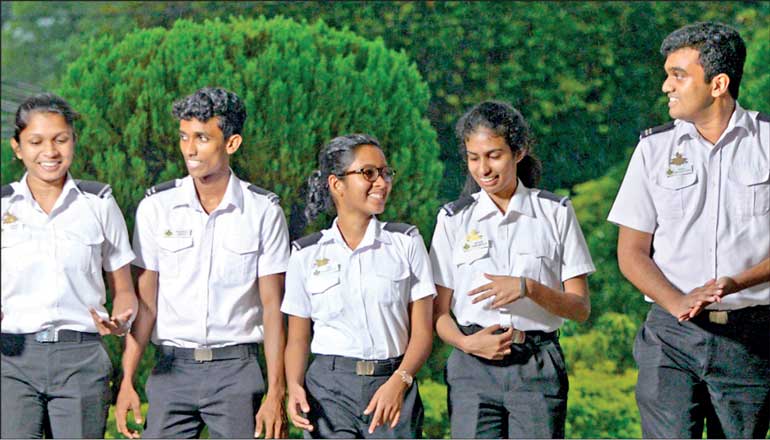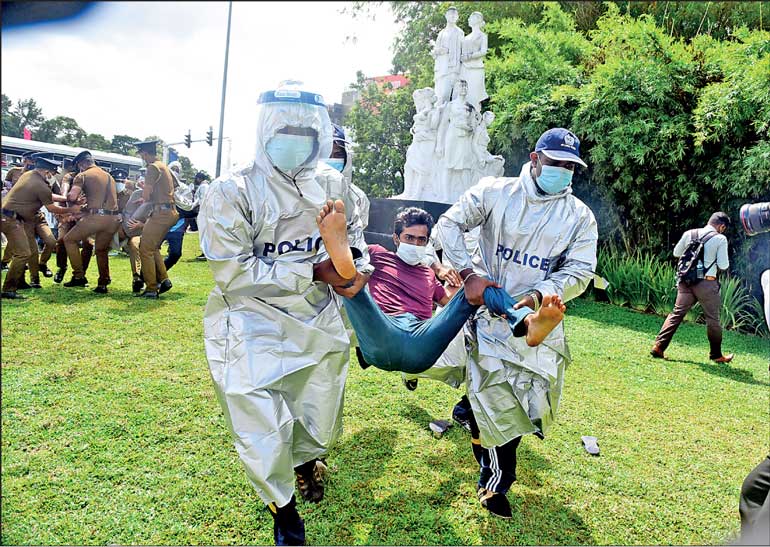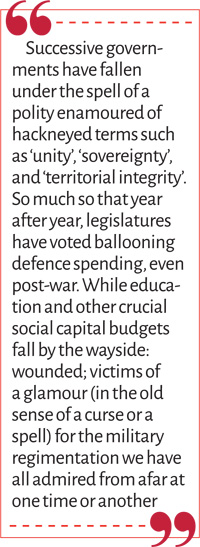Monday Feb 16, 2026
Monday Feb 16, 2026
Saturday, 31 July 2021 00:15 - - {{hitsCtrl.values.hits}}


STURM UND DRANG – for those enamoured of ‘Ordnung’ (the order of a disciplined yet highly regimented society), the lessons of history from a century not quite over could be a cautionary tale...
 For ever so long, ‘militarisation’ was a dirty word in café society and among the ‘lib-dem’ elites. There was nothing good it could come to – at coffee mornings or on the cocktail circuit. Despite the existence of a plethora of societal evils, this was liberal Sri Lanka’s favourite whipping-boy.
For ever so long, ‘militarisation’ was a dirty word in café society and among the ‘lib-dem’ elites. There was nothing good it could come to – at coffee mornings or on the cocktail circuit. Despite the existence of a plethora of societal evils, this was liberal Sri Lanka’s favourite whipping-boy.
Those ills have had to stand in line to get a look-in with the critics ahead of this traditional bug-bear – from an ailing economy, with no physicians but spin doctors (apparently); through natural disasters offshore and man-made abuses in the home; to forex, fertiliser, and currency crises.
Anti-militarisation sentiment trumped them all once upon a time... the safety-valve of self-indulgent capitalism, consumerism and corpulent profiteering blowing a gasket.
Add education to the mix these days... whether serious issue or political spectacle – take your pick.
Then the storm was suddenly over, and the sun shone through – on the social media battlefield at least. This was when the army recently stepped into the PHIs’ and nurses’ shoes, and civil society discovered that the milk of human kindness – not only blood in every sense – flowed in the security forces’ veins.
Of late, Colombo elites are falling all over themselves on Facebook and Twitter to hymn the tri-forces’ general praises.
Of course, these paeans may well be temporary. Public approbation is a fickle creature, as the electorate’s rapid and growing disenchantment with a once-worshipped regime has shown.
But for now, the positives of a regimented roll-out of the government’s accelerated vaccination drive have lulled the bourgeoisie – where once the apathy of bureaucracy and chaos of trade unionism rained down equally on a ruined populace. We’re becoming immune to more than the virus, it would seem...
 Enemy at the gate
Enemy at the gate
I suspect only the petit-bourgeoisie – as perhaps best represented by the JVP’s stalwarts – remains, with any degree of integrity, the ranks of Tuscany. They’re hard to sway, and have their faces set like flint against that Trojan horse of militarisation: the General Sir John Kotelawala Defence Academy (KDU).
Which opens the JVP and its present NPP allies on the issue at hand to charges of hypocrisy, perhaps? That those who once lived in glasshouses should not throw stones even now!
For was it not under the aegis of the old guard of the JVP that we were once brought to a bloodier terror? Whereby a riven nation-state faced anarchy at the hands of their regimented youth and shadowy paramilitaries? Is it not the highly unionised public service that still marches, as if to an unseen drum and unheard drum-major? Or is the grave allegation – that the mass protests against the KDU are itself a weaponised political assault with a neo-socialist agenda – only a spurious defence by a curiously regime-friendly grove of academics?
Whatever the answer is, it isn’t the province of one party to practise indoctrination – whether military, paramilitary or militant insurrection. Hypocrisy is to decry the JVP’s present outrage while embracing allegedly reformed former militants into government ranks in the amoral game of realpolitik.
Irony in the idea
There is also an irony in the disorderly demonstrations of the anti-KDU claques. It is that even those who see their bigger picture would rather not see their picture in the papers at all! The iron discipline of martially attired and glamorously coiffed recruits into the Kotelawala Defence Academy stands in sharp contrast to the rag-tag motley crew who make a nuisance of themselves to public and police alike.
The pro-militarisation brigade for its part has not been slow to capitalise on the cosmetic differences between militant protests and model platoons. ‘Don’t you want your children to be as well-behaved as our cadets?’ they seem to ask enticingly from their recruitment (O! enrolment) posters; wagging a dismissive head at the whole sorry raggedy lot of them being hauled off to court, detention, or worse. Is this what the taxpaying public expect from all those poorly employed beneficiaries of free education?
At first glance, there may be much merit in this specious argument to some analysts. After all, who amongst us hasn’t regretted the waste land of varsity militancy and ranted against its worst excesses – from the bane of ragging and the brutal rape of young minds by blunt bearded revolutionaries to benighted traffic jams and the blight of unemployable undergrads?
And no matter what, the ghost of a brace of youth uprisings in polite society’s mercurial memory has confounded the prospects of the JVP in its various avatars at sundry elections since 1994...
After which, it has ostensibly apologised for its wrongdoings! Repented with wrung hands and AKD’s dulcet tones echoing hollowly in our ears! And tried to shake off its bloody history! To no avail thus far?
 Terms of endurance
Terms of endurance
On the one hand, the then state’s heavy-handed crackdown has not been entirely forgotten, either. In fact, some of those responsible for its alleged agencies of torture are still at large and seemingly sanguine about their sanctity in the eyes of civil society.
Yet, who can recompense the lost generation that paid a heavy price on the altars of ruthless warmongers and unrepentant separatists on both sides of an illusory socio-political divide? Militarisation of a nation-state – then or now – makes a mockery of all good graces; and the small mercies of an insular society that once lived in idyllic harmony.
On the other, successive governments have fallen under the spell of a polity enamoured of hackneyed terms such as ‘unity’, ‘sovereignty’, and ‘territorial integrity’. So much so that year after year, legislatures have voted ballooning defence spending, even post-war. While education and other crucial social capital budgets fall by the wayside: wounded; victims of a glamour (in the old sense of a curse or a spell) for the military regimentation we have all admired from afar at one time or another.
Look back in anger
Don’t hate me for saying it, in confessional mode and fully apologetically. But I once thought the National Socialists of 1933-45 had the best uniforms. And I still haven’t quite grown out of the allure of the Nazi marches or Munich-style parades. Although a juvenile delinquency for the SS’s Nuremberg rallies has swiftly given way to post-conflict sense and sensibility – though, alas, it is not only the neo-Nazis who still dwell in – and also on – the past...
Shall we, then, forcibly grown up by real war and grim atrocities on every side, be held hostage by those who know no – or have never had – better prospects than the terrible determinism of the martial life being brought to bear down on a country at large?
Post-conflict society?
Administration after regime upon government has lost their opportunity to convert our swords into ploughshares.
Defence spending (according to online source Trading Economics) ballooned from $ 1.58 billion in 2011, two years after the war, to 1.85 billion dollars in 2015. From 2016 through 2020, it ranged between $ 1.543 billion in 2018 to 1.7 billion dollars in 2019.
Today, it’s poised to take a leap into the stratosphere for a nation-state at peace – such as we are – from 2020’s $ 1.56 billion to an estimated 1.775 billion dollars, according to a revelation made in parliament recently.
These figures represent an average 2% of GDP in a milieu where government debt to GDP hovered in the 80-90% region; while on the way forward, Sri Lanka is looking at debt-to-GDP ratios in excess of 1:1.
Meanwhile, Sri Lanka’s public spending on education – to take but one socio-political/economic indicator – has plummeted from 3.45% of GDP in 2016 through 2.8% (2017) to 2.12% (2018), according to The Global Economy online. And it is on a downward spiral despite repeated appeals by academics and relevant apex professional bodies to invest at least 6% of GDP in this vital sector.
Aye, there’s the rub!
The issue with KDU, meanwhile, is not that it’s a military – or strategic defence – university per se. Such a place of learning among the groves of academia is a perfectly acceptable development in a tactically positioned island-nation on the cusp of its global positioning becoming a key cog in the regional wheel. In fact, with a largely civilian administration and tutorship at present, it is a case in point for de-militarisation!
As long as it’s run along the lines of any other reasonably patterned analogue, no weaponised protest can stand against it. If, however, it doesn’t operate under the aegis of the National Universities Act – by virtue of which it would function vis-à-vis the University Grants Commission – it could barge into more than opposition at the barricades.
To wit: that it would run contrary to the spirit of free education that has been our social contract since independence. And stifle the critical engagement so characteristic of our state universities, warts and all. It could also enable a future expansion of the military ethos into civilian life by dint of setting up any sub-campuses of the highly regimented (yet, admittedly orderly and disciplined) KDU around the island.
It would also result in the unacceptable reality of a supplier and regulator of education being the same entity – in this case, the defence ministry de jure and the government de facto.
Also, such a campus could be the doctrinal nursery for a monstrous regiment of militarised bureaucrats and administrators – who, despite their admirable virtue, should be no more (or no less) than apparatchiks in a future martial regime, with scant regard for the values of a democratic society.
And, last but by no means least, the acme of civil society could well turn out to be mindless functionaries rubber-stamping the least wish of an already paternalistic state, as well as its present authoritarian regimes.
In which case, there would be no point citing comparable defence universities in the region, such as in Malaysia or Indonesia; because that would really be begging the question? Those nations are subversively militarised, faux-democratic and deceptively authoritarian regimes!
Shall we seek to pay the price of their costly progress at the expense of our civil liberties, rigorous approach to education thus far, and critical faculties as much as civil rights, as well as the messy democratic milieu we can still say we love... and treasure – warts and all?
End game
The jury is – as they say – still out. And that is but part of the issue.
That under an increasingly militarised milieu, the courts will be martial; the constitution interpreted rigidly in favour of a regime that favours force over friendly persuasion; and the state less inclined to be a kindly nanny but far more a strict governess.
While the best lack all conviction, and the worst on both sides of the socio-political divide are full of passionate intensity.
Brave new world, with O! such people in it? Or broken wounded nation, beating its ploughshares into swords again?
A lot depends on the ability and willingness of the incumbent regime to amend its agendas to align with constitutionality, common sense and civic courtesy – to say nothing of honouring a long-standing social contract. So we would have it edit the KDU Bill, not amend the UGC Act.
We ought not to make a desert – and call it peace. Don’t say you didn’t see it coming; or note the ominous writing on the wall, which indicated they were coming for you...
(Journalist | Editor-at-Large of LMD | Writer WFH)